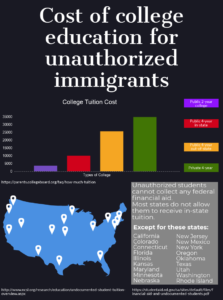Access to Higher Education for Unauthorized Students
By Kaitlyn D'Ambrosio
Young adults all across America are being told that the path to a good job and stable future is achieved by earning a college degree; however for some, it is not so easy. The rate of unauthorized immigrants who attend college is as low as 10 percent. Even fewer finish their higher education (US Dept of Education).
“Some schools don’t accept people who are apart of the DACA [program] or even undocumented students,” said Ahtziri Lopez-Santiago, Cabrini University student and DACA recipient.
Numerous factors impact the lives of unauthorized young adults who want to attend college. For them attending a college or university can be a struggle financially, academically and socially.
 Unauthorized students cannot file for FAFSA and do not get any federal financial aid toward their education. Some schools of higher education, like Temple University, set the cost of education for unauthorized students the same as out-of-state students, which makes the price go up.
Unauthorized students cannot file for FAFSA and do not get any federal financial aid toward their education. Some schools of higher education, like Temple University, set the cost of education for unauthorized students the same as out-of-state students, which makes the price go up.
“Students can’t get access to federally subsidized loans and they also are not eligible for in-state tuition at public universities. It can be a real barrier for undocumented students to both get into college and then to pay for it,” said Bethany Welch, PhD, Executive Director of the Aquinas Center in Philadelphia.
These students also struggle academically because for a lot of immigrant students, English is their second language. Therefore they often have to work harder when writing research papers, doing assignments or following the curriculum in class.
“Students who are non-citizens who make it into higher education are normally very intelligent students. Think about the fact that they have to be able to function at a high level in a language that is not their first language,” said Jennifer Bulcock, PhD, Assistant Director of Center for Immigration at Cabrini University.
“When I first started looking at schools and telling my parents I wanted to go to college, at first they were a little hesitant about it,” Lopez-Santiago said. “I reassured them that there's programs and schools who can help us. It’s not just U.S. citizens who can get a higher education.”
Ahtziri Lopez-Santiago discovered Cabrini University while doing college tours and fell in love with the atmosphere of the campus and how welcoming and how helpful the school was to help her and her family with the application and financial aid process. Since her family in unauthorized, they are unable to receive federal financial aid. They pay tuition out of pocket and rely on scholarships for financial support.
“Cabrini gives me an out-of-state [scholarship], the Cabrini Award, the Woodcrest and I just received the Mexican Consulate award. It is for students of Mexican descent it it was just started last year,” Lopez-Santiago said.
Lopez Santiago finds support from her peers, professors and advisers at Cabrini for help the changing policies, academics or her future career an an ESL, English Second Language, teacher.
“When people hear about my situation they want to know more,” Lopez-Santiago said. “Which I appreciate people wanting to know more about it because they hear undocumented and they don’t know exactly what that entails or things that I can and can’t do, especially as a student.”
Due to Lopez-Santiago’s status, she cannot take the typical education track because she cannot take the tests or become a certified teacher in Pennsylvania.
“The Wolfington Center does programming specifically around undocumented or unauthorized immigrants mainly raising awareness about these things so that faculty, students and staff know about the laws, statistics and circumstances of people going through this,” Ray Ward, director of Cabrini University’s Wolfington Center said.

